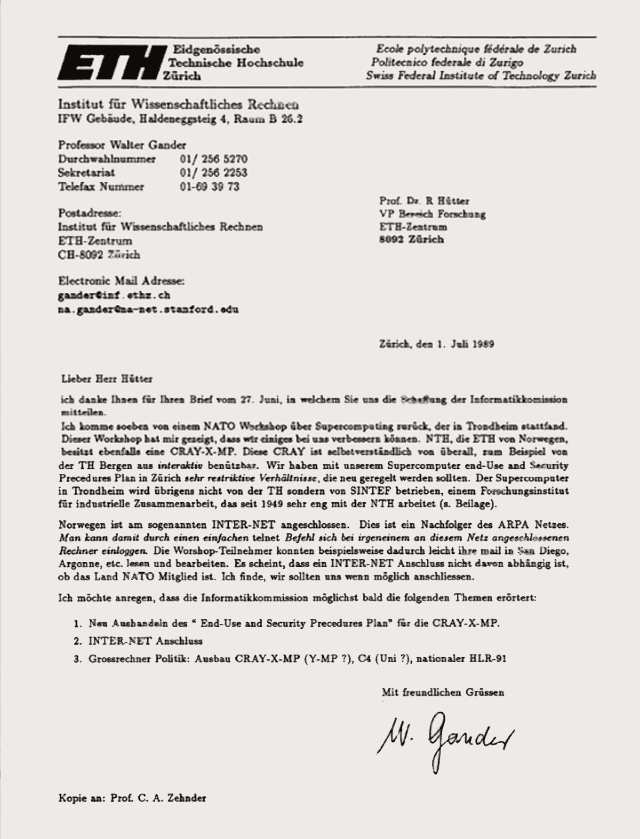«Email is useless» – Obstacles facing the pioneers at ETH
The ETH has been one of the top ten technical universities for many years and is constantly hitting the headlines with its new innovations. And yet it was only just under 30 years ago that ETH had no internet or email. In one of our last posts, we created a timeline to illustrate the arrival of the internet at our university. It takes pioneers to make these kinds of developments happen. One such pioneer was Walter Gander, who shared his experiences back in the day of the emails and websites with us for this article.
A university without internet – is it even possible?
Summaries, old exams, research – today’s students don’t know a world without internet. Thirty years ago, however, things looked very different. Back then, people still thought you were a freak if you knew what the internet was. It was an event in Scandinavia in 1989 that set ETH Zurich’s connection to the internet in motion.
Walter Gander, then Professor of Scientific Computing at the newly founded D-INFK, travelled to Norway for a NATO workshop on supercomputing. During the breaks, many of his colleagues were able to check their emails, as their email servers were connected to the Arpanet or already connected to the internet. In Switzerland, this was not yet the case. No sooner had Walter Gander returned, than he grabbed a pen and paper and wrote a letter to Ralf Hütter, Vice President of Research, expressing his wish: Switzerland and the ETH must be connected to the INTER-NET!
«The workshop participants could, for example, easily read and edit their mail in San Diego, Argonne, etc. It seems that an INTER-NET connection is not dependant on whether the country is a NATO member. I think we should connect to it if possible.»

Walter Gander was not the only one to push for the ETH to get hooked up to the internet. Some of his colleagues also wanted this, and the ETH was connected to the internet in the autumn of the same year. The first internet service provider in Switzerland was the SWITCHlan university network, which was set up by Prof. Bernhard Plattner.
Communicating with students
Our current situation really highlights just how important the internet and especially email can be for universities. For weeks now, lecturers have been mainly communicating with their students via email, which can be accessed from home thanks to the internet. What many people probably don’t know, is that email actually arrived at ETH before the internet. However, it wasn’t until a few years later that email was made accessible to students. Why did this process take so long?
Walter Gander was also a driving force in this regard. He knew that emails were an important means of communication to help stay connected with his colleagues from all over the world. ETH already had access to email, but it was only used sporadically, as not everyone had realised what it was for yet. This made it all the more difficult to convince people who did not use email, or used it very little, that the students could benefit from it. The majority of D-INFK professors believed that giving students access to email would only create unnecessary costs. And since they thought there was no demand, they wondered what would be the point. It’s now hard to understand where they were coming from, but nobody could have predicted how extremely relevant email would be today. For many, email was a gimmick that provided no added value.
Walter Gander, on the other hand, didn’t want to give up so easily. In one fell swoop, he finally managed to get some attention for his project: The primary reason he gave was that the exercises containing the assistants› programming tasks in Department of Computer Science should be tested electronically for corrections and therefore had to submitted in the same way. This, he said, could be done most easily via email!
Walter Gander found support for the implementation in Walter Schaufelberger and Bernhard Plattner. Both were very interested in Gander’s plans. As founder of the organisation Informatik dient Allen (IDA) (Information Serves All), Walter Schaufelberger had the necessary financial means for the trio to turn the dream of «email for students» into a reality.
And so it was, that from 1991 all students from the 3rd semester and up had an email account and 20 MB storage space.

About Walter Gander and the history of the D-INFK
Walter Gander studied mathematics at ETH Zurich and graduated in 1968; he was an assistant and doctoral candidate at the ETH until 1973. In 1979, he returned to ETH Zurich as a private lecturer, and from 1987 to 1991 he was an Associate Professor before becoming a Full Professor. In 1989, the ETH was departmentalised and the D-INFK was created. Walter Gander founded the Institute for Scientific Computing. The institute developed into the largest institute of the D-INFK until his retirement. In 2008, the Institute was dissolved and various new units such as the Institute for Visual Computing were created.
Links
- More on Walter Gander
- Decentralazation by IDA: ETHistory
- Walter Gander’s farewell lecture
Report
If you would like to know more about email traffic in the past, here is an interesting report by the ETH Institute for Computer Science High Performance Computing «The Numerical Analysis Net (NA-NET), author Mark Kent, January 1988 with abstract by Walter Gander, October 1987: https://polybox.ethz.ch/index.php/s/uAri3iI9D5EiFCi
History of IT Services and ETH Zürich
- ITS history I : The creation of the ITS logo
- ITS history II : Through the ages of technology
- ITS history III : The origins of ITSM
- ITS history IV : IT Training Lab, Episode 1
- ITS history V : IT Training Lab, Episode 2
- ETH history I : Internet access at ETH
Text by Kaja Walter and Francine Tobler, ITS PR & Communication


